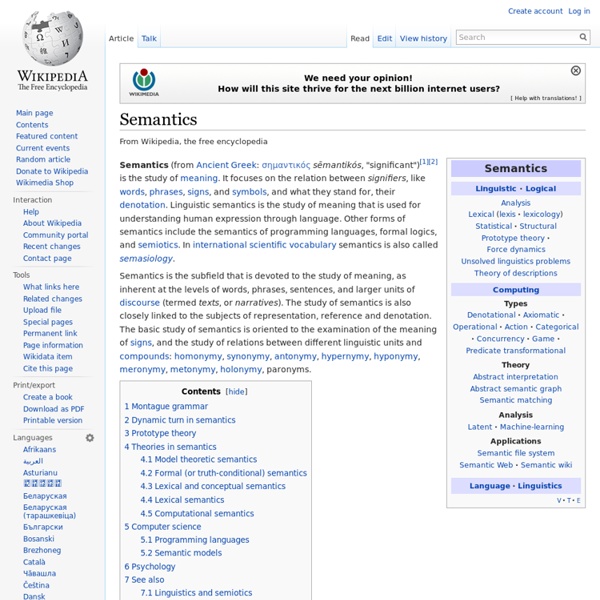Pragmatics
Pragmatics is a subfield of linguistics and semiotics that studies the ways in which context contributes to meaning. Pragmatics encompasses speech act theory, conversational implicature, talk in interaction and other approaches to language behavior in philosophy, sociology, linguistics and anthropology.[1] Unlike semantics, which examines meaning that is conventional or "coded" in a given language, pragmatics studies how the transmission of meaning depends not only on structural and linguistic knowledge (e.g., grammar, lexicon, etc.) of the speaker and listener, but also on the context of the utterance, any pre-existing knowledge about those involved, the inferred intent of the speaker, and other factors.[2] In this respect, pragmatics explains how language users are able to overcome apparent ambiguity, since meaning relies on the manner, place, time etc. of an utterance.[1] The ability to understand another speaker's intended meaning is called pragmatic competence.[3][4][5] Example: "I"
Relational Databases and the Semantic Web (in Design Issues)
$Id: RDB-RDF.html,v 1.25 2009/08/27 21:38:09 timbl Exp $ Up to Design Issues There are many other data models which RDF's Directed Labelled Graph (DLG) model compares closely with, and maps onto.
GeoSPARQL
GeoSPARQL is a standard for representation and querying of geospatial linked data for the Semantic Web from the Open Geospatial Consortium (OGC). The definition of a small ontology based on well-understood OGC standards is intended to provide a standardized exchange basis for geospatial RDF data which can support both qualitative and quantitative spatial reasoning and querying with the SPARQL database query language. In particular, GeoSPARQL provides for: The Ordnance Survey Linked Data Platform uses OWL mappings for GeoSPARQL equivalent properties in its vocabulary.[3][4] The LinkedGeoData data set is a work of the Agile Knowledge Engineering and Semantic Web (AKSW) research group at the University of Leipzig,[5] a group mostly known for DBpedia, that uses the GeoSPARQL vocabulary to represent OpenStreetMap data. Example[edit]
Semiotics
Semiotics frequently is seen as having important anthropological dimensions; for example, Umberto Eco proposes that every cultural phenomenon may be studied as communication.[2] Some semioticians focus on the logical dimensions of the science, however. They examine areas belonging also to the life sciences – such as how organisms make predictions about, and adapt to, their semiotic niche in the world (see semiosis). In general, semiotic theories take signs or sign systems as their object of study: the communication of information in living organisms is covered in biosemiotics (including zoosemiotics). Syntactics is the branch of semiotics that deals with the formal properties of signs and symbols.[3] More precisely, syntactics deals with the "rules that govern how words are combined to form phrases and sentences".[4] Terminology[edit] Ferdinand de Saussure, however, founded his semiotics, which he called semiology, in the social sciences:
Ambiguity
Ambiguity is an attribute of any concept, idea, statement or claim whose meaning, intention or interpretation cannot be definitively resolved according to a rule or process consisting of a finite number of steps. The concept of ambiguity is generally contrasted with vagueness. In ambiguity, specific and distinct interpretations are permitted (although some may not be immediately apparent), whereas with information that is vague, it is difficult to form any interpretation at the desired level of specificity.
Interpersonal relationship
Field of study[edit] The study of interpersonal relationships involves several branches of the social sciences, including such disciplines as sociology, psychology, anthropology, and social work. Interpersonal skills are extremely vital when trying to develop a relationship with another person. The scientific study of relationships evolved during the 1990s and came to be referred to as 'relationship science',[1] which distinguishes itself from anecdotal evidence or pseudo-experts by basing conclusions on data and objective analysis. Interpersonal ties are also a subject in mathematical sociology.[2] Importance[edit]
The Association Ontology Specification
This work is licensed under a Creative Commons Attribution License. This copyright applies to the Association Ontology Specification and accompanying documentation in RDF. Regarding underlying technology, the Association Ontology uses W3C's RDF technology, an open Web standard that can be freely used by anyone. The Association Ontology specification provides basic concepts and properties for describing specific association statements to something, e.g. an occasion, a genre or a mood, and enables furthermore, a mechanism to like/rate and feedback these associations in context to something on/ for the Semantic Web. This document contains a RDFa description of the Association Ontology and some additional information and examples. Status of This Document
DBpedia
DBpedia ( from "DB" for "database" ) is a project aiming to extract structured content from the information created as part of the Wikipedia project. This structured information is then made available on the World Wide Web.[1] DBpedia allows users to query relationships and properties associated with Wikipedia resources, including links to other related datasets.[2] DBpedia has been described by Tim Berners-Lee as one of the more famous parts of the decentralized Linked Data effort.[3] Background[edit] The project was started by people at the Free University of Berlin and the University of Leipzig, in collaboration with OpenLink Software,[4] and the first publicly available dataset was published in 2007. It is made available under free licences, allowing others to reuse the dataset.
Semiosis
Introduction to theory[edit] Discussion[edit] Semiosis is the performance element involving signs. Although a human can communicate many things unintentionally, individuals usually speak or write to elicit some kind of response.
Nominalization
Nominalization in various languages[edit] English[edit] From the viewpoint of linguistic prescriptivism, nominalizations are considered to make sentences more difficult to follow and to promote wordiness.



